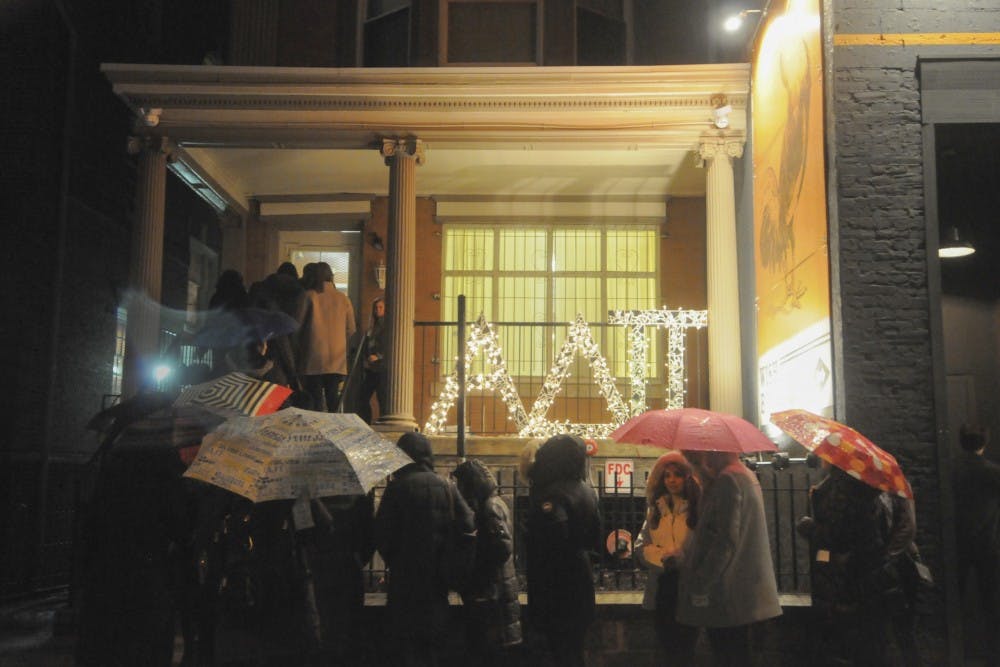Sororities confer obvious social benefits — at least for those girls who make it through the rush process, according to Penn psychologist Melissa Hunt.
Hunt’s study on sorority rush at Penn, published in the spring 2016 issue of Oracle: The Research Journal of the Association of Fraternity/Sorority Advisors, found that although the women who rush and ultimately join a sorority enjoy a boost in their senses of belonging and self-esteem, those who are unsuccessful experience negative effects.
Inspiration for the study came to Hunt when she read an article in The Daily Pennsylvanian about bid night, featuring many girls who were pleased with their sorority placements. “Notably absent from the article was any mention of women who had failed to match,” she said. “It struck me that we were missing information about that important group.”
Along with 2014 College graduate Colleen Kase, who was a senior at the time, Hunt set out to learn more about this group of girls who did rush but either withdrew from the process or were not offered bids.
The two sent out surveys via email to all 1,395 freshman girls in the Class of 2017 at four different points during the 2013-2014 school year — one in November, one in early January before recruitment began, one in late January following recruitment and one at the end of March. Overall, 171 girls completed all four surveys.
Out of these respondents, there emerged three distinct groups. Two of these groups already had high levels of self-esteem and belonging — one planned to rush while the other did not.
“We had hypothesized that women who planned to rush would be hungry for connection and belonging,” Hunt said. “Instead we found that most women who definitely planned to rush were uniformly happy, extraverted, and already had a sense of belonging.”
To Hunt’s surprise, the third group of girls — who were less confident and had a lower sense of belonging — was rather large. “The middle group of girls who were more unhappy and uncertain of their place in college surprised us as well. We had not anticipated them being such a large group.”
The surveys found that the members of this “middle group,” who would theoretically receive the greatest benefit from joining a sorority, were actually the least likely to receive a bid.
Among all of the girls who rushed — both the members of the first and the third groups — the rush process at least temporarily dampened their self-esteem.
“Rush seems like such a superficial, one-way, I just got judged based off a 5 minute conversation type situation, which can be extremely unnerving, especially for college freshman who honestly are just looking for more friends,” said rising Wharton sophomore Sanika Puranik, a member of Sigma Kappa sorority. “Greek life though, once in a sorority, introduced me to a subset of people I wouldn’t have otherwise met. It’s like a larger, flexible family to supplement my comfort on campus.”
Like Puranik, women who did receive bids reported an increased sense of belonging on campus after recruitment, while those who did not receive bids suffered blows to their self-esteem. Meanwhile, Hunt noted, the already-confident girls who chose not to rush experienced a temporary spike in their self-esteem during rush, followed by a return to its baseline level.
“Watching gaggles of girls in miniskirts and high heels and makeup wandering around campus in tight groups making artificially excited but shallow conversation with each other makes one happy one isn’t participating and ends up being a bonding experience, of sorts, with other women who also are not participating,” Hunt said.
Rising College sophomore Elaine Lee, who did not rush in the spring, said she does not regret her decision. “As someone who was already invested in a lot of other extracurriculars and knew how to make upperclassmen friends through activities, I didn’t see the use of joining a sorority just so I could find a social label that, in the end, belonged to a social hierarchy completely arbitrary based on looks and connections.”
The results of the study, according to Hunt and Kase, could have significant implications for the effectiveness of the sorority system and the current recruitment process.
“Colleen Kase and I both believe that national rush guidelines should be amended to allow women to visit only the sororities they are interested in joining,” Hunt said. “This would decrease the number of potential ‘rejections’ and would also mean women would have to spend less time engaged in superficial, brief visits to large numbers of houses.”









